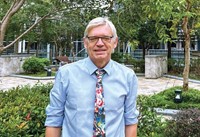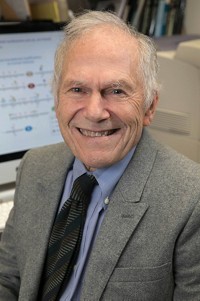Advertisement
Grab your lab coat. Let's get started
Welcome!
Welcome!
Create an account below to get 6 C&EN articles per month, receive newsletters and more - all free.
It seems this is your first time logging in online. Please enter the following information to continue.
As an ACS member you automatically get access to this site. All we need is few more details to create your reading experience.
Not you? Sign in with a different account.
Not you? Sign in with a different account.
ERROR 1
ERROR 1
ERROR 2
ERROR 2
ERROR 2
ERROR 2
ERROR 2
Password and Confirm password must match.
If you have an ACS member number, please enter it here so we can link this account to your membership. (optional)
ERROR 2
ACS values your privacy. By submitting your information, you are gaining access to C&EN and subscribing to our weekly newsletter. We use the information you provide to make your reading experience better, and we will never sell your data to third party members.
Awards
Kyoto Prize in Advanced Technology goes to Karl Deisseroth
Award honors Stanford professor’s pioneering work in optogenetics
by Linda Wang
June 15, 2018

Karl Deisseroth, professor of bioengineering and of psychiatry and behavioral sciences at Stanford University, is the winner of the 2018 Kyoto Prize for advanced technology.
“It’s a tremendous honor, and I feel very fortunate to have worked with so many talented students and postdocs over the years who worked with me on this project,” says Deisseroth, who is the youngest person to win this prize.
Deisseroth pioneered the field of optogenetics, which has enabled scientists to use light to manipulate the activity of nerve cells in the brain of lab animals and understand how that stimulation affects the animal’s behavior. Applications of this research include better understanding of brain disorders such as schizophrenia, depression, and Parkinson’s disease.
“Nobody could have predicted 14 years ago that putting some algae genes into neurons would give us insights into psychiatry, for example,” says Deisseroth. “There are optogenetics guided clinical trials now where people are using insights from optogenetics to guide other kinds of interventions for diseases like drug addiction.”
“It’s really been amazing to see not only experiments that I hoped would be possible, but also many things I never would have imagined,” he says. “It’s a testament to basic science.”
He envisions the future of this field to have even broader applications. “As people get insights into how neural circuitry actually works causally, that will make all kinds of clinical interventions, whether they’re pharmacological, or brain stimulation, or even behavioral, that will make them all more precise and powerful.”
His colleagues say he is incredibly deserving of this honor. “In addition to driving extraordinary, generously shared, science and technology, Karl has been an outstanding mentor,” says Viviana Gradinaru, professor of neuroscience and biological engineering at California Institute of Technology, who was a postdoc in Deisseroth’s group. “Former trainees include highly accomplished scientists, such as Feng Zhang, Ilana Witten, Polina Anikeeva, and Kay Tye, which makes Karl particularly deserving of the Kyoto prize, which honors not only excellent science but also the betterment of humankind, which Karl consistently does through his science and trainees.”
The Kyoto Prize is awarded by Japan’s Inamori Foundation in the categories of advanced technology, basic sciences, and arts and philosophy. The prizes, which include a gift of 100 million yen (approximately $913,000), will be awarded at a ceremony in Kyoto, Japan, on Nov. 10.






Join the conversation
Contact the reporter
Submit a Letter to the Editor for publication
Engage with us on Twitter